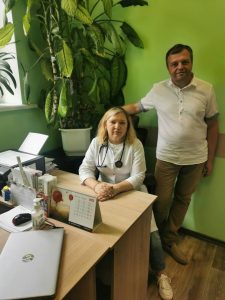
- About BDF
- Programs
- To banks
- For enterprises
- News BDF
- Public information
- Home
- Success stories
- “A Grant is an Opportunity to Accelerate What's Important”: How a Family Clinic from Mykolaiv Region Uses Grant Support to Operate Autonomously
“A Grant is an Opportunity to Accelerate What’s Important”: How a Family Clinic from Mykolaiv Region Uses Grant Support to Operate Autonomously
In 2018, after the implementation of the medical reform that allowed private institutions to sign public contracts, a Family Clinic was opened on Hrushevskoho Street in Pervomaisk, Mykolaiv region. It was founded by Kateryna Korovkina – a doctor with over 20 years of experience in family medicine, who combines daily practice with running her own medical business.
Today, the clinic employs three doctors – two family physicians and one pediatrician – and five junior medical staff members. They serve about 5,000 patients, and there are still dozens more waiting to sign a declaration. “We already have a closed list of patients. There’s a waiting list, and we’re thinking about expansion – of both the staff and the premises.”
Lessons of war: from blackouts to energy resilience
The full-scale war did not spare Pervomaisk, even though the town itself was not under occupation. Migration, air raids, tension, and humanitarian challenges.

“We gathered on the third day. I asked: who’s ready to stay and work? The whole team said: we’re staying. And then we made the decision: we serve everyone, regardless of declarations. That was our front line,” recalls the entrepreneur.
Pervomaisk became a logistics hub for displaced persons from southern Mykolaiv and Kherson regions. In the first months, the clinic served everyone who came – even without declarations or documents. In shelters where people went during air raids, they set up a mobile medical point.
“There were cases when a person would simply collapse in the shelter – blood pressure, heart. Our nurses provided assistance right there, on the spot,” adds Kateryna.
Later, the biggest challenge became the blackouts: refrigerators for vaccines, the electronic healthcare system, diagnostics – everything depended on electricity. For two months, the clinic operated exclusively on a generator. It was expensive and unstable.
“Medical equipment doesn’t work well with a generator. The cardiograph, for instance, gives distorted results when powered by a generator. That’s a risk for the patient,” explains the doctor.
Solar solution
That’s how the idea emerged to switch to fully autonomous energy supply – a solar power plant. The clinic had already prepared the technical solution and started forming their own funding. But without external support, implementation could have been delayed by another year. That’s when they learned about the grant project “Support for energy sustainability of micro and small enterprises in Ukraine.” They applied for Component 1 – and won.
“To do this on our own, we would’ve had to postpone other important plans: diagnostics, expansion. Thanks to the grant, we saved a year. And in medicine, that means a lot,” explains Kateryna Korovkina.
Funding under the project will allow them to purchase all the core system components. The planned system is a hybrid: it will consist of 30 solar panels with a total capacity of 15 kW, an inverter, and two batteries.
“If the sun is shining – we’ll run autonomously. If not – we’ll charge from the grid or the generator. It’s much more reliable than having to start an engine daily, risking the performance of sensitive medical equipment,” says the entrepreneur. The system is planned to be launched this summer so they’ll be fully prepared for the winter season.
Social business has the right to grow
Kateryna Korovkina is convinced: such programs should support businesses with a social mission. “There are profitable businesses – they’ll manage. But those like ours. Low profitability, high responsibility. We won’t shut down, even if we’re operating at a loss. But help is needed precisely for such businesses – so we cannot just survive, but grow.”
The saved funds are planned to be spent on purchasing an ultrasound machine and expanding diagnostic services. “A grant is not just money. It’s a chance to keep going. If your goal aligns with the purpose of the program – apply. Don’t think someone else will get it. It’s like a lottery – the one who buys the ticket wins,” Kateryna smiles.
This publication was prepared within the support of the international cooperation project “Energy resilience support for micro and small enterprises in Ukraine” under the ReACT4UA Program (Utilization and Implementation of the Association Agreement between the EU and Ukraine in the field of Trade) that is co-funded by the German Government and the Norwegian Agency for Development Cooperation (NORAD). It is implemented by the German federal company “Deutsche Gesellschaft für Internationale Zusammenarbeit (GIZ) GmbH”.
The project aims to increase the resilience of the Ukrainian economy to recurrent power outages and assure business continuity of Micro, Small and Medium Enterprises (MSMEs) by financially supporting solutions for an uniterrupted access to electricity.
The content of this publication is the sole responsibility of the Business Development Fund and does not necessarily reflect the views of the Government of Germany, NORAD, or GIZ.